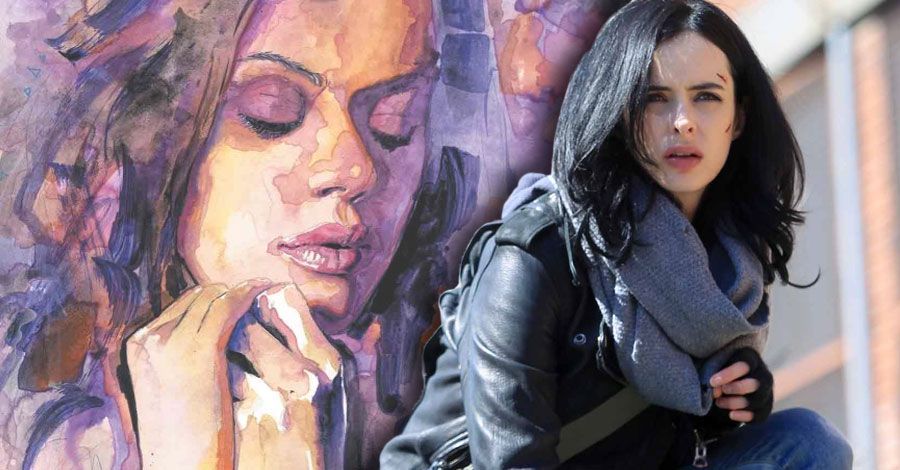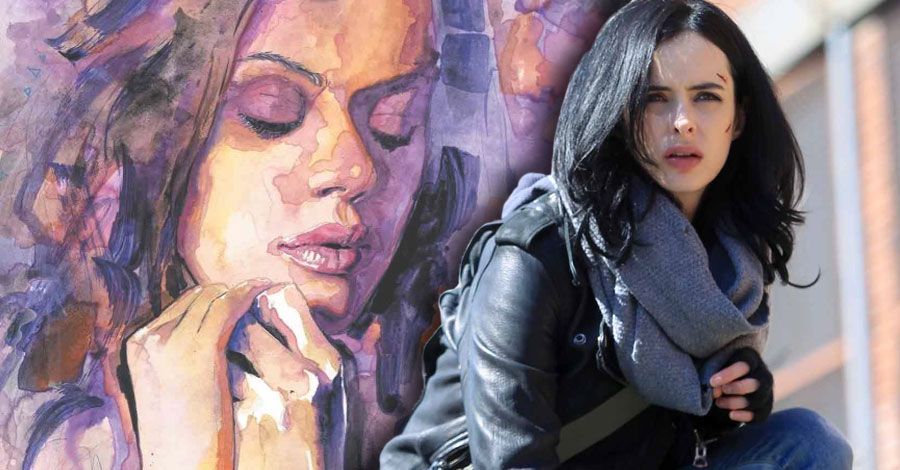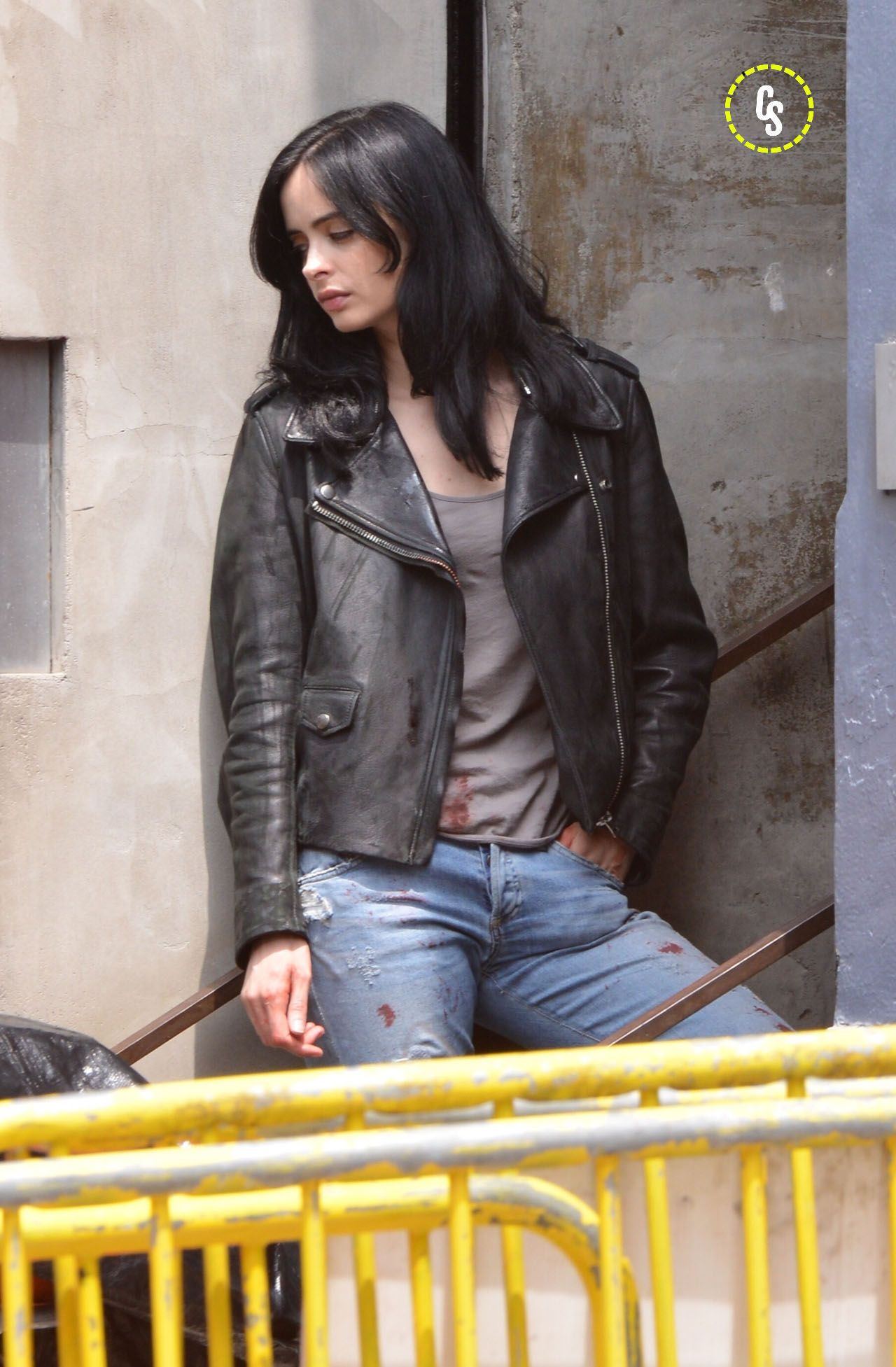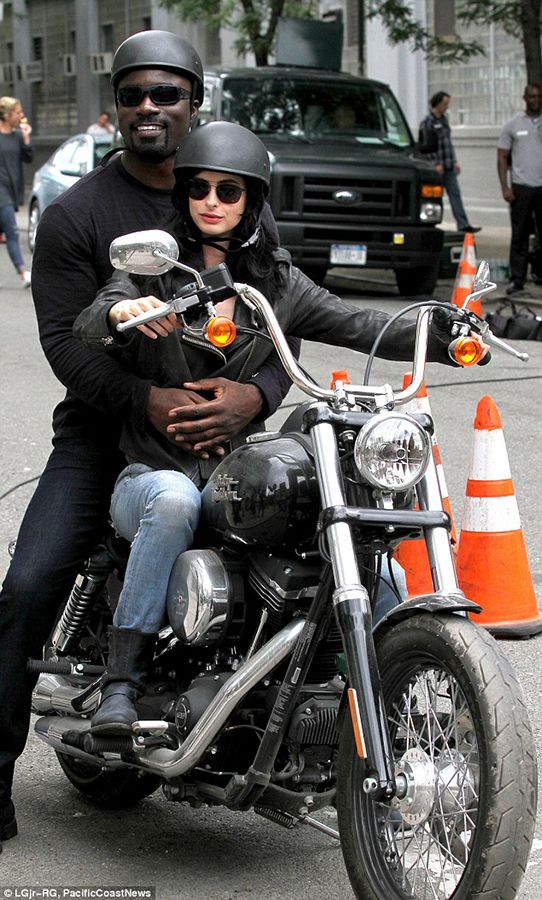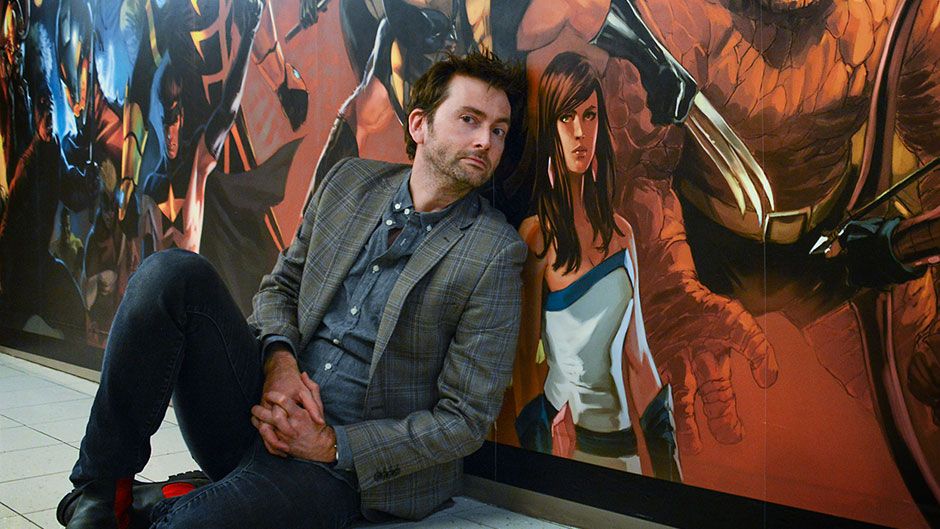Marvel's "Jessica Jones" is getting closer to making her television debut on Netflix, and the creative forces behind the series are guaranteeing that, much like its predecessor "Daredevil," the show will push the envelope toward dark, edgy storytelling without crossing an R-rated line.
During Netflix's presentation at the Television Critics Association's summer press tour in Beverly Hills, CA, Comic Book Resources took part in a small press roundtable for the upcoming series. Showrunner Melissa Rosenberg, a former writer/producer on "Dexter" and the screenwriter behind all of the "Twilight" films, and Jeph Loeb, the head of Marvel Television, revealed some key details about the series based on Brian Michael Bendis and Michael Gaydos' cult-favorite "Alias."
RELATED: Jessica Jones Co-Creator Bendis Praises Netflix's "Faithful" Adaptation
Not only did the creative team assure a very specific faithfulness to the spirit of the adult-only comic, promising an intense psychological thriller through the prism of the Marvel Cinematic Universe, they revealed details behind the casting of star Krysten Ritter, how Mike Colter's Luke Cage -- in line to headline his own Netflix series -- will play into the storyline, the interpretation of Hell's Kitchen in the MCU and seductive but horrifying aspects of the villainous Kilgrave, based on The Purple Man and played by David Tennant.
Now that you've established the Netflix side of the Marvel Cinematic Universe, what's going to set this show apart [from "Daredevil"]?
Melissa Rosenberg: I think that starts with the characters, and the character as created by Brian Michael Bendis is such a profoundly unique character from the get-go. What an incredible, creative playground, to be able to work in his world and the Marvel world.
Jeph Loeb: I think Melissa really nailed it -- the character of Jessica Jones is as different as any other that we have in the Marvel Universe. She's remarkably strong, and yet remarkably damaged. She's remarkably dry and witty as she is emotional and real. And for us, it's an opportunity to expand out the kinds of storytelling that we're doing on the street level heroes.
And that's really where the similarities with "Daredevil" live, in that this is New York. These are people that are trying to not necessarily make the world a better place, but trying to make the neighborhood a better place and, in some cases, make their own lives a better place. It's one of things that we've always, when asked what's the difference between what these heroes do and what the Avengers do, we say the Avengers are there to save the universe, and the characters that we're presenting in the Netflix group -- Daredevil and Jessica Jones and Luke Cage and Iron Fist -- are really here to save the neighborhood.
And if you make the neighborhood as big as it was in "Daredevil," where it literally was the neighborhood, it was Hell's Kitchen, it was at stake in what he was fighting against. In "Jessica Jones," it really is, in some cases, just about one person, and how important a single person can be. And then, how that can expand out from that, really, on an emotional level. That's really where I think the power of the storytelling is, and what Melissa and the writers have achieved in this series, which makes it have its own voice and at the same way, part of a much larger story that we're telling.
Rosenberg: She's trying to save her apartment.
When we get to the private eye story in the comics, a lot of her former superhero identity is informed by her interactions with a bunch of other Marvel Comics superheroes. How is that background going to inform the character who we meet [in the series]?
Loeb: I think you need to watch the show. I think the highest compliment that we've gotten so far -- because so few people have actually seen it -- was from Brian Bendis himself, who really felt that we had brought this to life in a way that was honest and compelling. And I think that speaks to the quality of the people that are -- of the performances and at the same token, each of the scripts and the voices that they were given.
Can you be a little more specific? Like in "Daredevil," we don't get exactly how he got his powers, what his powers are, how they specifically work. With Jessica, is it going to be the same?
Rosenberg: I think it's all the slow unraveling, which is what makes the storytelling, from what I'm doing, interesting. It's really about her character. So we'll find out some things, and other things, we're going to be -- hopefully, we'll be on for a long time, and there's lot of interesting places to go with it.
RELATED: Loeb on "Captain America: White," "Daredevil" & Expanding Marvel TV
Loeb: When you think about how origin stories are told, the fun of working in the Marvel Universe is that you have literally decades to draw upon. Jessica, as a character, is relatively young when you compare her to someone like one of the Avengers characters, but nonetheless has a very loyal and vocal fan base. And that has a lot to do with Brian, and Brian's vision to who the character was. All of that is there.
How it's presented, and when it will be presented, is very much the kinds of things where you're sort of peeling back the layers in order to get there, and that's really the fun. One of the things that's unique about the opportunity to be on Netflix is that you'll be able to get 13 hours of this all at one time. I find myself, yet again, as I was at "Daredevil," apologizing to the employers of America saying, "I'm really sorry that none of your people came to work the next day because they couldn't stop watching the show."
The source material was designed to be darker and edgier than the traditional Marvel line. How comparable is the series to the source material as far as edginess -- is it in the same area? Does it go even further?
Rosenberg: It starts there, and goes all the way dark. The tone that Brian Michael Bendis set is what attracted me to the project in the first place. It was very gritty and real and we just keep going with that.
Loeb: I mean, look, we're never going to make -- I say "never" and someone will -- at the moment, there are no plans for us to tell an R-rated story. As we did with "Daredevil," we encouraged Melissa to push as far against that envelope as we could. And look, we also had the benefit now of seeing that the Marvel brand could present something that would push the envelope the way that "Daredevil" did, and certainly in terms of the way that the language, in terms of the violence. This is different, though.
Rosenberg: Your definition of dark -- for me, what's dark is when a character will go in their own psyche. It's not necessarily about stripping off clothes or pulling someone's eye out. It's about, how far can you let a character go? And I think that's what attracted me about that, is that she can go to some very questionable places in her own psyche. And that, I think is, to me, the darkest.
Loeb: And again, now we have the ability to sort of say, "Now you've seen the trick once. Please come back and see a whole new magic act." And that is that it was not that long ago, literally, that we were doing interviews and saying that we see "Daredevil" as a crime drama first and a superhero show second. And there was a lot of controversy about that. There was like, "Oh, we don't understand that. How is that possible that Daredevil's a superhero? What are you talking about?" And then they saw the show, and went, "Oh, that's what you meant by that."
What we've always talked about is, this is much more of a psychological thriller in that it is about what people do to each other on a very visceral and emotional level. And how that either forges you or breaks you. And when you have a villain who is plays so deliciously by David Tennant, who has the ability to be able to push people to do things that maybe they would ever not have done. Or maybe they would have. Maybe they have it inside of them. Maybe they don't have it inside of them.
Those are all the questions, I think, that Melissa and the writers just really swam in. And those were the things that were much more exciting than whether or not we were going to be able to do the hundred-foot fall or any of the other things that you can think about. That's not to say that we didn't do that, because we are Marvel. It really was always about who is she? How damaged is she? And how the hell is she going to get through this day?
And that, for us, is the excitement of being able to watch each episode is that you are compelled to see whether or not the puzzle is going to be solved. And the puzzle isn't the mystery of the show. The mystery is, is she going to survive and how? And that's something, I think, the amount of tension that you feel when you watch each episode, we're hoping that you're uncomfortable. We're hoping that you're just compelled to watch the next one, because this is really good stuff.
What made Krysten Ritter the perfect Jessica Jones?
Rosenberg: Krysten Ritter has such range. We've seen her be funny, on "The Bitch [in Apartment 23]" and we've seen her as a guest on drama on "Breaking Bad." This takes that drama and goes all the way into the depths of emotion, and yet, she can deliver a dry line. There's something so unique about her, too. She's not going to be mistaken with somebody else. She, herself, is a character that makes an impression. And she just has range.
Loeb: I think one of the things that's so unique about the show as well is the relationship that she has both on screen and off screen with David Tennant. And what David brought as the villain of the story, because in the same kind of way that Vincent D'Onofrio carried his half of "Daredevil," and Charlie [Cox] did such an awesome job of being Matt Murdock and holding up a side of good, to have two characters that are as complex as what David is playing in Killgrave and who Krysten is playing as Jessica, and watching how each of them sort of push each other's buttons.
One of the things that we're very proud of is, there will be times when you're uncomfortably okay with what it is that Killgrave is doing, and maybe you shouldn't be. What Melissa does so elegantly is suddenly remind you, "Oh, no. He's really a horrible person." And so that's really the fun of what's going on. And to watch her -- Jessica and Krysten -- to go through the trials of what it is that he's putting her through, and then finding out the many layered reasons as to where those things are happening, that's really the part of the show that makes it so intriguing, so compelling.
And that, I have to give Melissa credit and the writers in terms of being able to take a story that is so incredibly unique and has never been done in the Marvel Universe in terms of the cinematic universe, to be able to see how these two people effectively play off of each other.
Can I ask about the version of New York in terms of Hell's Kitchen? Do you have time periods that you have recreated? [The real world version is] very shiny these days.
Loeb: That's the Hell's Kitchen that you know. The Hell's Kitchen that's in the Marvel Universe on the other hand, in the same kind of way that -- this is kind of a spoiler, but there is no Avengers Tower, either. I know you've all brought your tickets. You think you're going there. That unique moment actually happened.
The way that all of this was born was, I was watching "The Avengers" for about the fifth time, and there was that incredible action sequence toward the end of that film where they're destroying Grand Central, and they're coming up. And suddenly, as I was watching it, I started thinking to myself, "What's so amazing about this movie is that if you were to go five avenues over, and a little bit down, you're now in a whole different part of New York that isn't being invaded by giant whales and alien beings. There's just regular old street crime going on over there. And if we could find our way across town, there would be a whole new door would be opened to the Marvel Universe."
And so, that's really where we play it. The truth of the matter is, we shoot in New York, and we're on the streets and we're in the bars, and we're up on top of the fire escapes. We're not that far from those places, so that, yes, there absolutely is an area that has been gentrified, but you don't have to go that far from it to be able to go, "Oh, this looks just like it used to." And that's the places that we find ourselves.
One of the things that Brian Bendis was specific about praising you for was the casting of Mike Colter as Luke Cage. This show is a spring-board for introducing Cage, a character that we're going to see center stage in a later series. How you handling the balance of doing that while still telling Jessica's story?
Rosenberg: Yeah, I mean, Jeph has talked about this. In Jessica Jones' story, as envisioned by Mr. Bendis, Luke Cage plays an enormous part in showing us who she is and taking her on a certain journey. But that was one of the challenges of the season is, he has his own story to tell. So what can we tell of his life? Really, what we can tell is what his relationship with Jessica is, what it turns into. So that was the storytelling that we [pursued], and they have a wonderful chemistry together. It's really nice.
Loeb: For us, it is an opportunity to meet Mike Colter and his portrayal of the character. We never want anyone to feel like you need to watch any of the shows in order to understand what's going on. You should be able to enjoy them in their own unique way. I think one of the real triumphs of what it is that Melissa did, and the writers, is that, make no mistake about it, Luke has an enormous impression in terms of what's going on, but it is Jessica's story. His purpose in the story is to help us understand who she is and what is happening to her. And in that case, Mike delivers on that. And we get to see what's happening along the way.
I think that's it. We don't really see it as a springboard as much as, if you did not know that there was going to be a Luke Cage show, there's a very compelling, interesting story about this really interesting character named Luke Cage, who she's involved with. And their relationship is what's important. And then, what happens before then and what happens after then, leaves us an enormous amount of room to do it. But by no means do you feel like it's a planted spinoff. It literally is this is a story. And in this story, he is one of those characters.
"Jessica Jones" is the first major female-led, name-in-the-title MCU property. What are the challenges and meeting the expectations, given the demand that's arisen lately?
Rosenberg: I think the trap that we fall into is the "female" in front of the "superhero." I never approached this as, "I'm writing for a woman." I'm writing for a character. And I think that's one of the things that industry-wide, it's like, if you're writing for a guy, it's a character. If you're writing for a woman, it's a female character. So that, alone sets some boundaries in place.
That's why I think there are so few juicy, interesting roles for women, superhero or otherwise, is that women are defined gender-first. People of color are defined race-first. So if you just are approaching it from the point of view of what's a complex, interesting, messed up, cool character to tell, then you cast it in your mind as a woman or anyone else, you've got complexity then, and you're no longer limited.
Can you talk about applying that to TV?
Loeb: I think that Mel said it beautifully, in that Marvel doesn't look at our characters in terms of, "Well, she's a female superhero," or, "He's a black superhero," or, "He's a white, rich guy." You start with the person. And then, who's the best way to tell that story?
In this particular case, the story of who Jessica Jones is, and the journey that she goes on is what is compelling. The fact that she is also a woman is something that adds to the power of the character, but we don't feel that the responsibility to us is to tell the story in terms of well, now, we're the first female superhero that Marvel's going to be doing in the Marvel Cinematic Universe.
When we look at all of our characters, people like Daisy Johnson and the Wasp, Agent May, and Agent Carter -- "Agent Carter" is also a female-led story where she is in the title, so for us, it's very much about who these people are, and whether or not they're going to be able to get through the day. And do it in a way that we, as viewers, find it incredibly compelling, and you want to continue to watch that story and get involved with those people and see what happens. And hopefully, want to see more of. And so gender and race and all those things are interesting elements, if they're interesting elements. But other than that, let's hope that we can tell a really compelling story about Jessica Jones.

